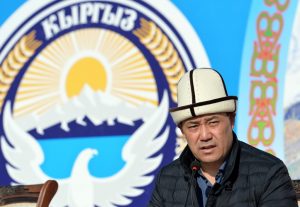In Kyrgyzstan, where the cold winter has ushered in a thick blanket of smog, people voted to cement Sadyr Japarov’s meteoric victory. On January 10, Japarov rocketed past 16 other candidates with 79 percent of the vote. The nationalist politician also helped push through a shift in the country’s political landscape from a parliamentary system to a presidential one. Following the resignation of Sooronbay Jeenbekov three months ago, Japarov’s unusual rise from prison to the presidency is something unseen in the history of modern Central Asia.
Since the Soviet Union’s dissolution, the four other regional countries — Tajikistan, Turkmenistan, Kazakhstan, and Uzbekistan — have seen presidential changes largely driven by death-in-office or carefully managed succession. Kyrgyzstan, on the other hand, has long been viewed an outlier, toppling three (of four) presidents via protests. Compared with the other countries in the region, Kyrgyzstan grants more room for civil society and oppositional political activity. While Kyrgyzstan enjoys a more open and dynamic political environment than what we see in neighboring states, like Kazakhstan where parliamentary elections on January 10 delivered the expected result, it was no surprise to see Japarov gaining sweeping powers and winning the elections in Kyrgyzstan.
Presidential Elections in Kyrgyzstan
The October 2020 parliamentary elections in Kyrgyzstan ended not with a new parliament but with a political crisis and an unexpected change of government. The election results were annulled, the country’s president resigned, and power was concentrated in the new prime minister’s hands. The January 10 vote took place within the the context of economic and political instability — and deepening concern among experts and citizens. New parliamentary elections were delayed in favor of organizing presidential elections. Candidates struggled to organize campaigns with limited financial resources and little time. Meanwhile, Japarov — who resigned from his dual prime minister/acting president roles in mid-November — has been accused of using state resources and elite networks to boost his efforts.
Japarov’s image is framed by a series of injustices that, according to his supporters, the politician was subjected to. In prison for three years, Japarov experienced great upheavals: first, he was found bleeding after a failed suicide, then he lost both his parents and his son while behind bars. Japarov is often compared to the outgoing U.S. President Donald Trump, especially after Trump’s supporters stormed the U.S. Capitol last week. The Japarov phenomenon, in some ways, is not a unique Kyrgyz event — it fits into global trends informed by pervasive disillusionment with the establishment.
The Khanstitution and the Rise of Nationalism
Japarov’s political party “Mekenchil” (“Patriot”) was especially popular in rural regions of Kyrgyzstan, and his supporters often called him a “real patriot” and came to meet him donning national costumes. Japarov’s popularity and his meteoric rise amid the October events came as a surprise to many. It is still unclear which influential figures backed Japarov’s landslide victory, though there are suspicions that organized criminal groups groups played a role.
Within this context, Japarov’s rise has been accompanied by calls to radically change the system and re-define Kyrgyzstan’s political landscape. Currently, in Kyrgyzstan, there is a hybrid government system in which a unicameral parliament has the right to dismiss the government and announce a vote of no confidence in the president, while the prime minister can appoint members of the government. In his election campaign, Japarov often spoke to traditional values; in particular, he proposed a rewrite of the constitution in which a new authority would be created — the people’s kurultai (a traditional kind of parliament) — that would oversee the president and parliament and include a section on folk values in the country’s fundamental law. The people’s kurultai would be entitled to hear reports from the president, the speaker of parliament, and the speaker of the kurultai. No other contemporary Central Asian country has such an institution of power. The draft constitution pushed forward by Japarov and his supporters was dubbed the “khanstitution” by opponents who said it would legitimize authoritarian rule.
Critics of Japarov fear his victory could tip Kyrgyzstan toward the style of strongman rule dominant in much of the former Soviet Union. The 51-year-old president-elect argued that parliamentarism and the party system have been “discredited.” According to the draft constitution, the president would be able to appoint and dismiss members of the government, chairmen of state committees, and heads of other executive bodies. He could also propose bills, not just approve of them, under the draft. Thus, all executive power would be in the hands of the president.
More than 80 percent of voters backed the referendum to return to a presidential system of government. For many, this would mark the end of Kyrgyzstan’s greatest democratic success: the transition after the April 2010 revolution to a parliamentary system. Turnout was meager at less than 40 percent; it seems that people are fed up with elections and political chaos.
Kyrgyzstan’s first two presidents were overthrown by street protests to ringing shouts of “Akayev ketsin!” (“leave, Akayev!”) or “Bakiyev kestin!” Jeenbekov resigned to more mild calls of a similar nature; none is remembered with much fondness or sympathy. Japarov will have to learn how not to repeat the mistakes of past Kyrgyz presidents, or people will start wondering when calls for “Japarov ketsin!” will begin.
Aruuke Uran Kyzy currently works at TRT World Research Centre as a researcher and a journalist.

































